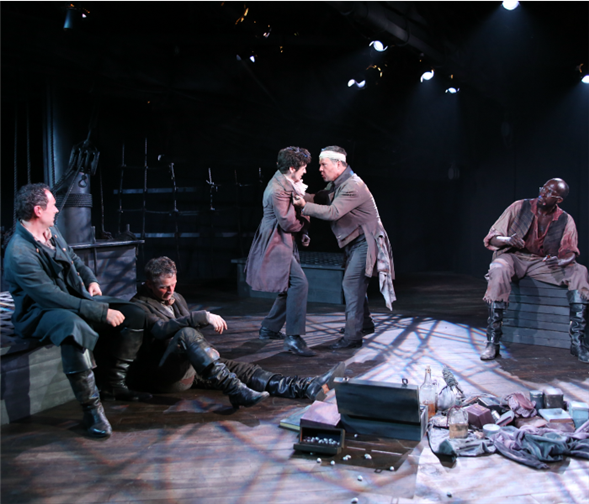Translate Page

Axis Company's The Vast Machine examines the merchants behind the slave trade
---
A few months ago, actor Julian Rozzell was browsing a casting website when he noticed a call for a new play at Axis Company called The Vast Machine set aboard a 19th-century slave ship. Of the five characters, one was black -- but he was a doctor, not a slave. Intrigued, Rozzell contracted the theatre, a first for him, and asked to audition for the part.
"I knew from the synopsis that I wasn't one of the people in chains, and that's what made it interesting and dangerous," Rozzell says. "I gleaned that this guy was a liaison between the slaves and the white crew. But the real test was, what are the playwright's politics? How is she seeing this from her perspective?"
Written and directed by Axis artistic director Randy Sharp, The Vast Machine takes place on a fictional slave ship called the Perisher, stranded on a windless sea following a slave mutiny that left a majority of the crew dead. To make matters worse, since the importation of new slaves was outlawed years earlier in 1808, the merchants are in danger of being caught illegally transporting human cargo.
The entirety of the 80-minute play takes place on the ship's deck, with the five surviving crewmembers, including Rozzell's doctor, arguing over what they should do with the 123 Africans below. Sharp came up with the idea after reading Marcus Rediker's book The Slave Ship: A Human History, and the author served as historical consultant on the play.
"The biggest human sin is not sadism or evilness, it's really complacency," Sharp says. "I'm really interested in looking at, thinking about, and identifying with the 99.9 percent of everybody who participated in, turned their faces, and committed these horrendous acts. How does that happen? What is the mechanism of that kind of complacency?"
In the show, the only signs of the slaves are the blood on the deck, and the muffled sounds of chains and voices below. When asked why she didn't include slaves as characters, Sharp is blunt. "I'm a white girl and I would never presume that I could tell the story of the interior of a cargo hold of uprooted, enslaved, terrorized African Americans."
The absence of slaves means there's no easy way to elicit audience sympathy. Instead, playgoers listen to the five men debate their moral quandary: Should they sacrifice their lives and let the slaves go free? Or kill the lot and flee? It's stomach-churning to hear them talk about sinking the ship or throwing the slaves overboard -- that's the point. And it can't be dismissed as mere fiction. The play was inspired by the 1781 Zong Massacre, when crew members drowned more than 130 sick slaves in order to collect insurance money on their lost "property."
Sharp hopes audiences will go to the dark and uncomfortable place of seeing themselves in these five flawed men. "I'd like to think I would open the gates and that I would sacrifice myself," she says. "But you know, hundreds of people didn't do that, and they're not all evil and crazy, so let's talk about who they are."
Making things more complicated, one of those men is a black man profiting off the institution of slavery. Rozzell's nameless doctor was born a free man but could only find work at sea. His intentions are noble, and the Perisher is meant to be his final voyage before he sets up a medical practice for blacks. Rozzell, whose credits include the Public Theater's Civil War epic Father Comes Home From the Wars, believes his great-grandfather came to this country on a similar transatlantic slave ship voyage, so this show has been a delicate operation for the experienced actor.
"I don't quite understand why an African American would work on a slave ship," he admits. "For now, I'm just thinking about humanity and the bad stuff that people do for money and power, and all of the atrocities we as human beings endure on a day-to-day basis." And, of course, he's greatly concerned about the way the legacy of slavery affects African Americans today. "The stuff is still happening," Rozzell says forcefully. "There are three institutions that have been used in America to enslave: the slave ship, the plantation, and now prison. In order to make a change, you have to understand all of the elements."
---
Follow Diep Tran at @DiepThought. Follow TDF at @TDFNYC.
Photos by Dixie Sheridan